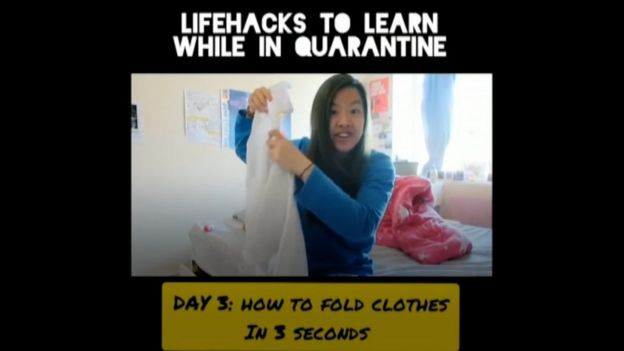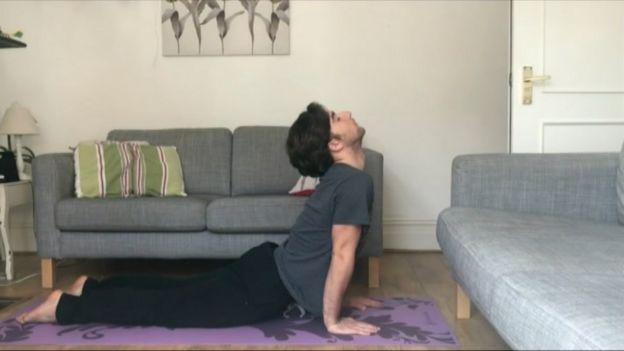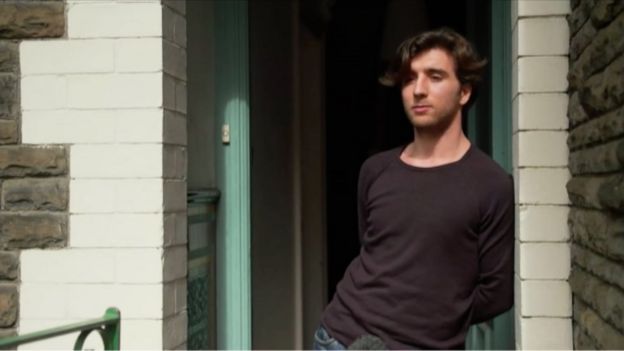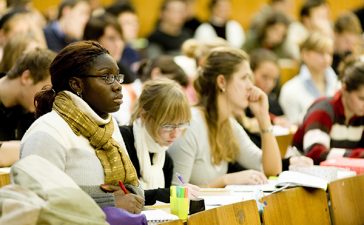“Although I would love to be with my family, right now it is better for me to stay put.”
For Jia Wei Lee, the decision to isolate in Treforest, Rhondda Cynon Taff, rather than return to her home country of Malaysia during the coronavirus pandemic was not an easy one.
To pass the time, aside from writing her dissertation, the final year student at the University of South Wales has started recording fun, uplifting and helpful videos on her Facebook page.
Ms Lee is one of thousands of students who are staying in the towns and cities where they study, rather than returning home to their families in the UK or abroad.
Universities Wales estimates that between 10% and 15% of the student population of Wales are in the same position as Ms Lee.
Both of her parents are “front liners” in Malaysia and she has managed to speak to them every day, despite being “a bit worried about them”.
To occupy herself, Ms Lee, 24, has been recording videos of herself and friends on a Facebook page she set up called Feeling Light in Darkness.
“I want to show people that everybody is in this together and we are facing isolation and quarantine all as a community even though we are self-isolating,” she said.
“There are a lot of things to do. That’s why I’m collaborating with my friends and family to produce a video every single day to tell them ‘OK, you can try this out for cooking and try this out for baking’.”

‘Breathless’
Cardiff University masters’ student Andrea Gaini, 23, who’s originally from Florence, Italy, said he initially found the situation difficult.
“I had a week where I was feeling really anxious. Just because all my friends were going home – especially my friends from Italy.
“They were like, ‘you need to come home with us’ and I was like, ‘I think that’s not the best decision for me’. I just felt really anxious, I felt bit breathless sometimes,” he said.

However, he said he has had support from his course director.
“She’s been amazing. When I told her that I was feeling a bit anxious, she just emailed me a few times just checking on me making sure that I’m OK.”
It is also estimated 10-15% of students living in university-run halls – a similar proportion to the overall figure – have stayed during the lockdown.
Prof Julie Lydon of Universities Wales said: “That’s obviously a considerable community and keeping them safe, while they continue to study with us through our remote mechanisms, is one of our highest priorities.”
Across Wales, universities are offering support in a variety of ways, such as catering and shopping, mental health services and teaching.

“We’ve had to move very quickly to work in different ways and to make sure we keep our university community – staff and students – safe,” said Prof Lydon.
“The challenge is that we don’t know quite how this is going to end or when it’s going to end, and therefore we’re working closely as a group of universities to share experiences and to make sure we understand with government, the ways that we should continue to interpret that advice and stay secure as an environment.”
Torrin Wilkins, 20, who studies International Politics in Aberystwyth, said the town felt “a bit deserted”, but he had received plenty of support from the faculty.
“They’ve really done a lot of continuation support and mental health services and everything is being moved online,” he said.
“But obviously it’s quite difficult at the moment because they can’t really send people around or anything due to social distancing.”
Mr Wilkins, who is originally from Hertfordshire, said there was a “bizarre atmosphere” at his accommodation with him being “one of the few people there”.
His university-owned hall of residence usually houses about 1,000 students.
“There are few places I would rather be stuck during a pandemic than Wales. It is a lovely place and it certainly makes that one walk a day a lot more interesting.”






